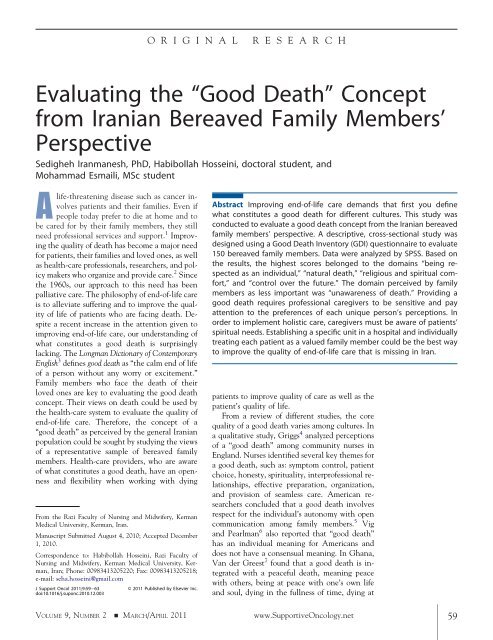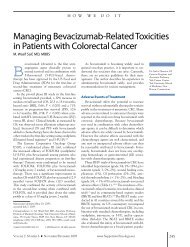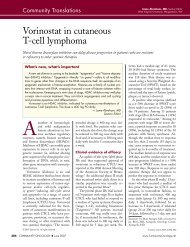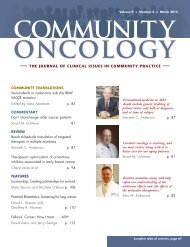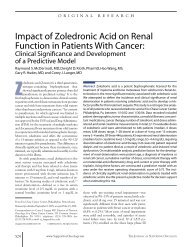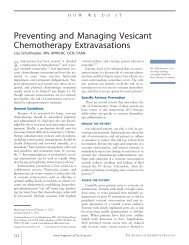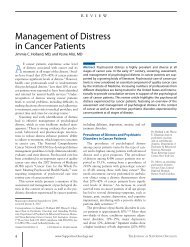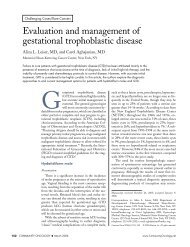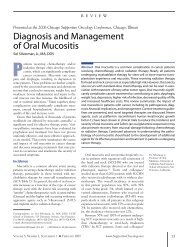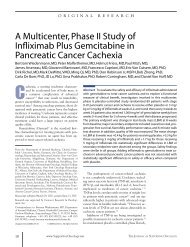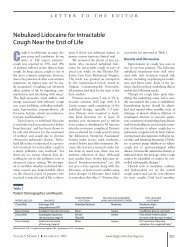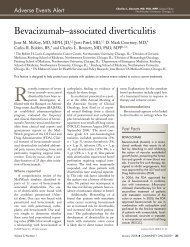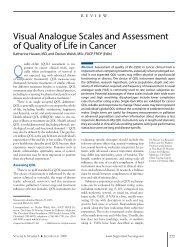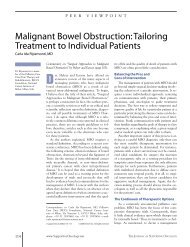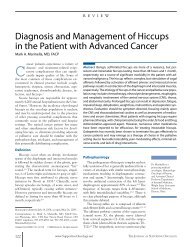Evaluating the “Good Death” Concept from Iranian Bereaved Family
Evaluating the “Good Death” Concept from Iranian Bereaved Family
Evaluating the “Good Death” Concept from Iranian Bereaved Family
Create successful ePaper yourself
Turn your PDF publications into a flip-book with our unique Google optimized e-Paper software.
O R I G I N A L R E S E A R C H<br />
<strong>Evaluating</strong> <strong>the</strong> <strong>“Good</strong> <strong>Death”</strong> <strong>Concept</strong><br />
<strong>from</strong> <strong>Iranian</strong> <strong>Bereaved</strong> <strong>Family</strong> Members’<br />
Perspective<br />
Sedigheh Iranmanesh, PhD, Habibollah Hosseini, doctoral student, and<br />
Mohammad Esmaili, MSc student<br />
Alife-threatening disease such as cancer involves<br />
patients and <strong>the</strong>ir families. Even if<br />
people today prefer to die at home and to<br />
be cared for by <strong>the</strong>ir family members, <strong>the</strong>y still<br />
need professional services and support. 1 Improving<br />
<strong>the</strong> quality of death has become a major need<br />
for patients, <strong>the</strong>ir families and loved ones, as well<br />
as health-care professionals, researchers, and policy<br />
makers who organize and provide care. 2 Since<br />
<strong>the</strong> 1960s, our approach to this need has been<br />
palliative care. The philosophy of end-of-life care<br />
is to alleviate suffering and to improve <strong>the</strong> quality<br />
of life of patients who are facing death. Despite<br />
a recent increase in <strong>the</strong> attention given to<br />
improving end-of-life care, our understanding of<br />
what constitutes a good death is surprisingly<br />
lacking. The Longman Dictionary of Contemporary<br />
English 3 defines good death as “<strong>the</strong> calm end of life<br />
of a person without any worry or excitement.”<br />
<strong>Family</strong> members who face <strong>the</strong> death of <strong>the</strong>ir<br />
loved ones are key to evaluating <strong>the</strong> good death<br />
concept. Their views on death could be used by<br />
<strong>the</strong> health-care system to evaluate <strong>the</strong> quality of<br />
end-of-life care. Therefore, <strong>the</strong> concept of a<br />
“good death” as perceived by <strong>the</strong> general <strong>Iranian</strong><br />
population could be sought by studying <strong>the</strong> views<br />
of a representative sample of bereaved family<br />
members. Health-care providers, who are aware<br />
of what constitutes a good death, have an openness<br />
and flexibility when working with dying<br />
From <strong>the</strong> Razi Faculty of Nursing and Midwifery, Kerman<br />
Medical University, Kerman, Iran.<br />
Manuscript Submitted August 4, 2010; Accepted December<br />
1, 2010.<br />
Correspondence to: Habibollah Hosseini, Razi Faculty of<br />
Nursing and Midwifery, Kerman Medical University, Kerman,<br />
Iran; Phone: 00983413205220; Fax: 00983413205218;<br />
e-mail: seha.hosseini@gmail.com<br />
J Support Oncol 2011;9:59–63 © 2011 Published by Elsevier Inc.<br />
doi:10.1016/j.suponc.2010.12.003<br />
Abstract Improving end-of-life care demands that first you define<br />
what constitutes a good death for different cultures. This study was<br />
conducted to evaluate a good death concept <strong>from</strong> <strong>the</strong> <strong>Iranian</strong> bereaved<br />
family members’ perspective. A descriptive, cross-sectional study was<br />
designed using a Good Death Inventory (GDI) questionnaire to evaluate<br />
150 bereaved family members. Data were analyzed by SPSS. Based on<br />
<strong>the</strong> results, <strong>the</strong> highest scores belonged to <strong>the</strong> domains “being respected<br />
as an individual,” “natural death,” “religious and spiritual comfort,”<br />
and “control over <strong>the</strong> future.” The domain perceived by family<br />
members as less important was “unawareness of death.” Providing a<br />
good death requires professional caregivers to be sensitive and pay<br />
attention to <strong>the</strong> preferences of each unique person’s perceptions. In<br />
order to implement holistic care, caregivers must be aware of patients’<br />
spiritual needs. Establishing a specific unit in a hospital and individually<br />
treating each patient as a valued family member could be <strong>the</strong> best way<br />
to improve <strong>the</strong> quality of end-of-life care that is missing in Iran.<br />
patients to improve quality of care as well as <strong>the</strong><br />
patient’s quality of life.<br />
From a review of different studies, <strong>the</strong> core<br />
quality of a good death varies among cultures. In<br />
a qualitative study, Griggs 4 analyzed perceptions<br />
of a “good death” among community nurses in<br />
England. Nurses identified several key <strong>the</strong>mes for<br />
a good death, such as: symptom control, patient<br />
choice, honesty, spirituality, interprofessional relationships,<br />
effective preparation, organization,<br />
and provision of seamless care. American researchers<br />
concluded that a good death involves<br />
respect for <strong>the</strong> individual’s autonomy with open<br />
communication among family members. 5 Vig<br />
and Pearlman 6 also reported that “good death”<br />
has an individual meaning for Americans and<br />
does not have a consensual meaning. In Ghana,<br />
Van der Greest 7 found that a good death is integrated<br />
with a peaceful death, meaning peace<br />
with o<strong>the</strong>rs, being at peace with one’s own life<br />
and soul, dying in <strong>the</strong> fullness of time, dying at<br />
VOLUME 9, NUMBER 2 � MARCH/APRIL 2011 www.SupportiveOncology.net 59


